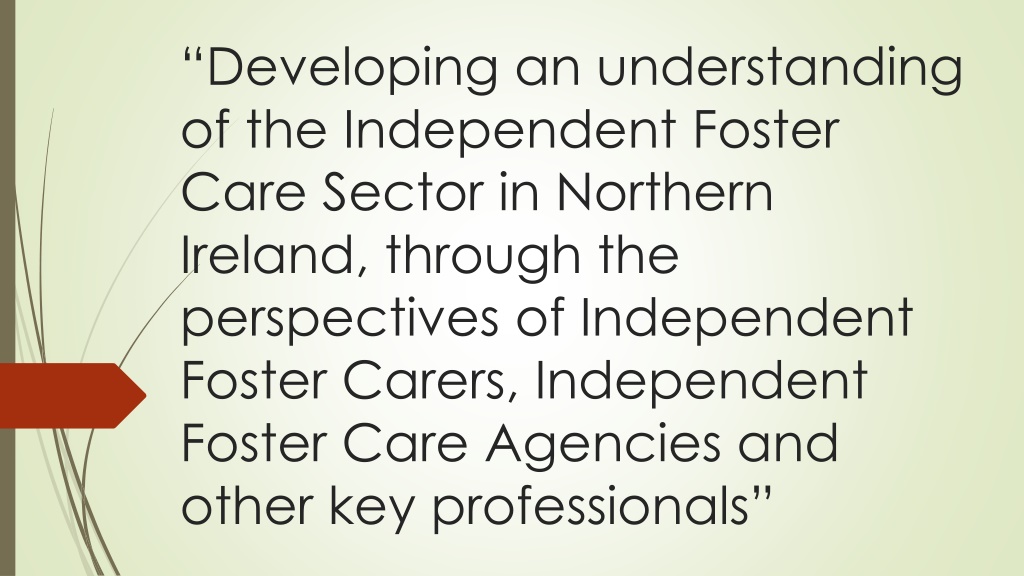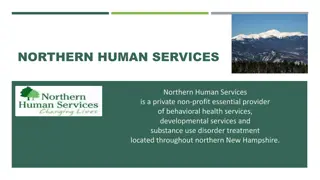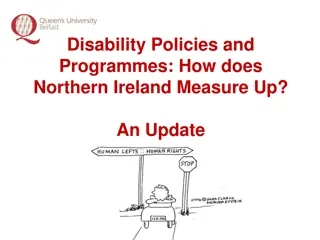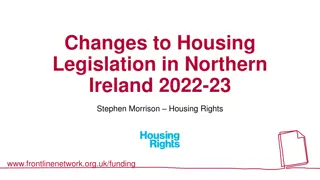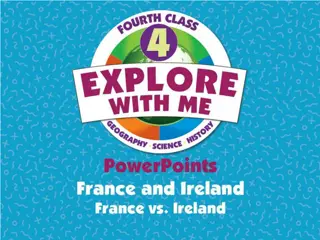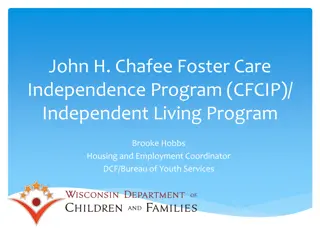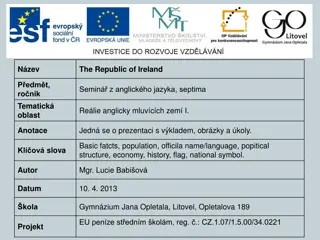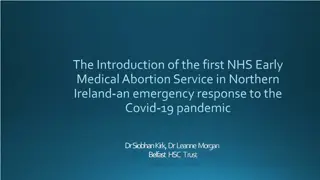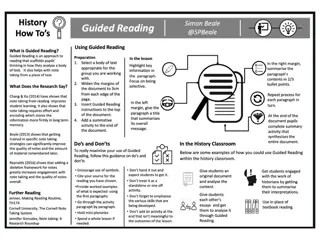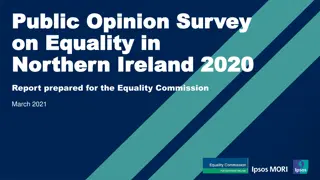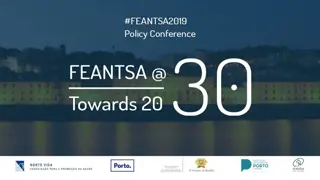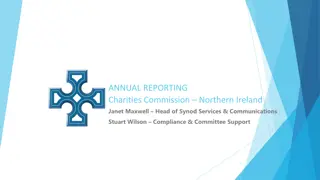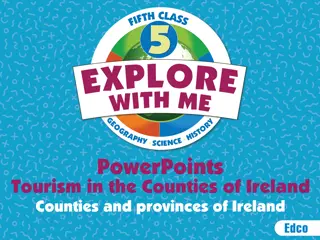Understanding Independent Foster Care in Northern Ireland
Exploring the Independent Foster Care Sector in Northern Ireland through the perspectives of Independent Foster Carers, Agencies, and key professionals. The research aims to address gaps in knowledge, amplify voices within the sector, and promote evidence-informed practices. Methodologies include questionnaires, focus groups, interviews, and a triangulated approach for data analysis. Ethical considerations encompass informed consent, privacy, anonymity, and data security. References to Social Research Methods and Children's Social Care Statistics in NI provide a robust foundation for the study.
Download Presentation

Please find below an Image/Link to download the presentation.
The content on the website is provided AS IS for your information and personal use only. It may not be sold, licensed, or shared on other websites without obtaining consent from the author. Download presentation by click this link. If you encounter any issues during the download, it is possible that the publisher has removed the file from their server.
E N D
Presentation Transcript
Developing an understanding of the Independent Foster Care Sector in Northern Ireland, through the perspectives of Independent Foster Carers, Independent Foster Care Agencies and other key professionals
Research Aims and Rationale * Address the gap in knowledge and create a profile, in order to detail the contribution that independent foster care provides to the care system in NI * To give foster carers, foster care agencies and other professionals within the independent foster care sector a voice for themselves; so that their experiences can be heard and included in research findings within foster care as an intervention. * Promote the creation, improvement or continuance of good evidence informed practice and assist with professionalism
Proposed Methodology Questionnaires Independent Foster Carers Focus groups Independent Fostering Agencies Interviews Other professionals involved in the sector
Data analysis and Interpretation Triangulated approach: Quantitative and Qualitative = to increase the level of knowledge about something and to strengthen the researcher's standpoint from various aspects
Ethical Considerations A draft protocol will be provided to Research Governance to enable a determination to be made regarding ORECNI approval and Trust governance requirements. An Integrated Research Application System (IRAS) workshop has previously been attended by the researcher; this will be updated as necessary. According to Cohen et al. (2007) there are also general ethical implications in carrying out research using questionnaires, focus groups and interviews. These are informed consent, privacy, anonymity, confidentiality, equality and storage of data. Privacy, anonymity and confidentiality will be assured as all data will be anonymised and all identifying details removed. No individual will be discriminated against in any way in the choosing of the sample or in the use of the data obtained, thus ensuring equality. It will be explained that data will be secured on an encrypted USB drive or computer hard drive to which only the researcher will have access.
References Bryman, A. (2016) Social Research Methods, Oxford: Oxford University Press. Children s Social Care Statistics Northern Ireland 2016/17 (2017) [online] Available at http://dera.ioe.ac.uk/30189/1/child-social- care-16-17_Redacted.pdf [Accessed on 27th March 2018]. Cohen, L.; Manion, L. and Morrison, K. (2007) Research Methods in Education, 6th edition, Oxon: Routledge. Department of Health (2017) Publication of Children s Social Care Statistics for NI 2016/17 [online] Available at http://dera.ioe.ac.uk/30189/1/child-social-care-16-17_Redacted.pdf [Accessed on 19th March 2018]. Gilbert, N. (2001) Researching Social Life, 2nd edition, London: Sage Publications Ltd. Golafshani, N. (2003) Understanding Reliability and Validity in Qualitative Research in The Qualitative Report, 8(4):pp597-607. Golding, K. (2003) Helping foster carers, helping children. Using attachment theory to guide practice Adoption and Fostering, 27(2):pp64-73. Guion, L.; Diehl, D. and McDonald, D. (2011) Triangulation: Establishing the Validity of Qualitative Studies, Florida: University of Florida, IFAS Extension. Henn, M.; Weinstein, M. and Foard, N. (2006) A Short Introduction to Social Research, London: Sage Publications Ltd. Ivankova, N.V.; Creswell, J.W. and Stick, S.L. (2006) Using Mixed-Methods Sequential Explanatory Design: From Theory to Practice in Field Methods, 18(1):pp3-20. McCarthy, G.; Janeway, J. and Geddis, A. (2003) The impact of emotional and behavioural problems on the lives of children growing up in the care system in Adoption and Fostering, 27(3):pp14-19. McSherry, D.; Malet, M F. and Weatherall, K. (2013) Comparing long-term placements for young children in care: The Care Pathways and Outcomes Study Northern Ireland, London: British Association for Adoption and Fostering. Mooney, J., Winter, K., & Connolly, P. (2016) Effects of a book gifting programme on literacy outcomes for foster children: A randomised controlled trial evaluation of the letterbox club in Northern Ireland in Children and Youth Services 65(2):pp1-8. Pope, C.; Ziebland, S. and Mays, N. (2000) Analysing qualitative data in British medical journal, 320(7227):pp114-116. Turner, W. and Macdonald, G. (2011) Treatment foster care for improving outcomes in children and young people: a systematic review in Research on Social Work Practice, 21(5):pp501-527.
Thank you for listening to me! Any help or advise you can give me will be very much appreciated.
